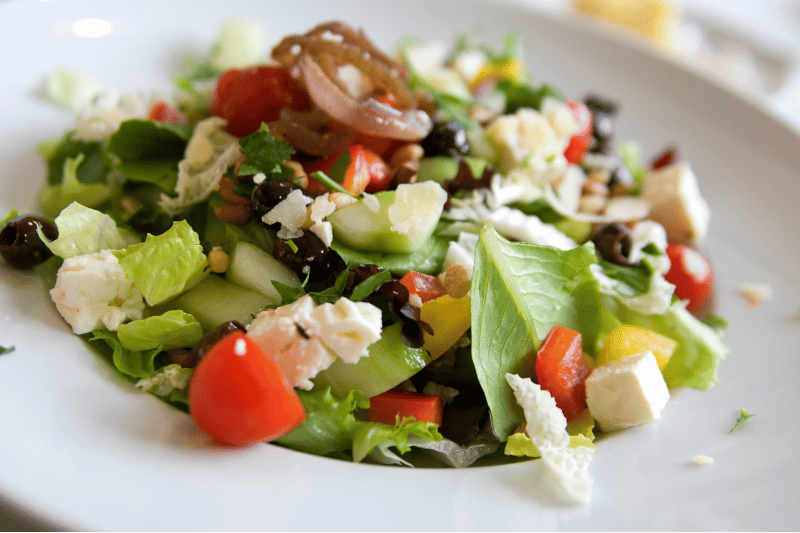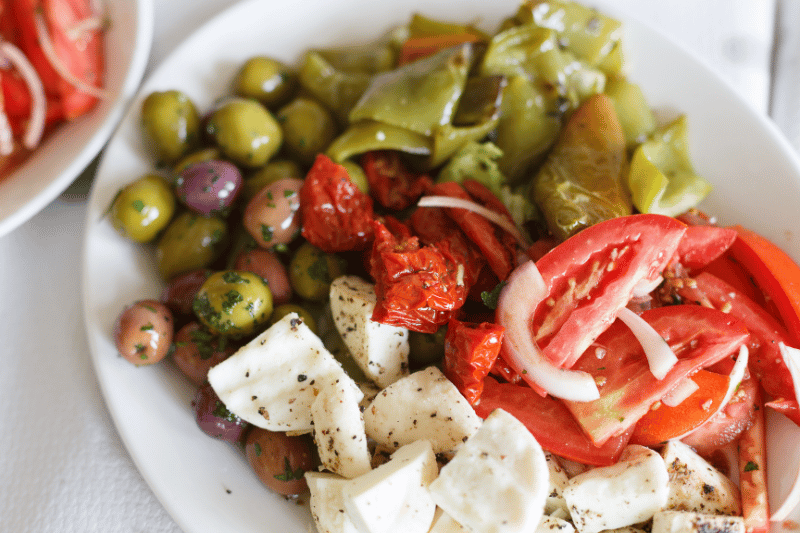The Mediterranean Diet Explained
The Mediterranean Diet isn’t just a trendy eating plan—it’s a lifestyle rooted in the time-tested eating habits of countries bordering the Mediterranean Sea, such as Greece, Italy, and Spain.
Known for its ability to promote longevity and prevent chronic diseases, this diet emphasizes fresh, whole foods, with a focus on balance and enjoyment.
The Mediterranean Diet has been hailed by researchers and nutritionists as one of the healthiest diets in the world.
In fact, it has consistently ranked as the #1 diet in the world by U.S. News & World Report for its proven health benefits and sustainability.
If you’re wondering, “What is the Mediterranean Diet?”,
this guide is your ultimate resource. We’ll explore its core principles, benefits, potential weight loss outcomes, and how you can start incorporating it into your daily life.
What Makes the Mediterranean Diet Unique?
Core Characteristics of the Mediterranean Diet
- Plant-Based Foundation: The diet prioritizes fruits, vegetables, whole grains, nuts, and legumes. These foods are nutrient-dense, high in fiber, and minimally processed.
- Healthy Fats: Olive oil is a cornerstone, replacing unhealthy fats like butter. Other healthy fat sources include avocados, nuts, and fatty fish.
- Moderate Protein: Emphasis is placed on lean proteins such as fish, poultry, and plant-based sources like beans. Red meat is eaten sparingly.
- Flavorful Herbs and Spices: Instead of relying on salt, the Mediterranean Diet uses herbs, garlic, and spices for seasoning.
- Social Eating: Meals are often shared with family and friends, emphasizing the social and cultural importance of food.
- Red Wine in Moderation: A glass of red wine with dinner is common but optional. Moderation is key.

What Are the Benefits of the Mediterranean Diet?
- Supports Heart Health
Studies show that the Mediterranean Diet reduces the risk of heart disease by improving cholesterol levels, reducing inflammation, and lowering blood pressure. - Aids in Weight Loss
This diet isn’t designed as a weight-loss program, but many people naturally lose weight by eating nutrient-dense foods and avoiding processed snacks. - Reduces Risk of Chronic Diseases
Research links the Mediterranean Diet to a lower risk of type 2 diabetes, Alzheimer’s disease, and certain cancers. - Improves Mental Health
Rich in omega-3 fatty acids from fish and nuts, this diet may help reduce symptoms of depression and anxiety. - Promotes Longevity
Residents of Mediterranean regions often live longer and healthier lives, which has been attributed to their diet and lifestyle.
How Much Weight Can You Lose on the Mediterranean Diet?
While weight loss varies based on factors like age, activity level, and caloric intake, many people lose between 1 to 2 pounds per week on the Mediterranean Diet. This steady weight loss is considered healthy and sustainable, as the diet prioritizes long-term lifestyle changes over quick fixes.
Pros and Cons of the Mediterranean Diet
Pros
- Sustainable and Enjoyable: Unlike restrictive diets, this plan is flexible and includes a variety of delicious foods.
- Scientifically Backed: Decades of research support its health benefits.
- No Calorie Counting: Focuses on food quality, not quantity.
Cons
- Can Be Costly: High-quality olive oil, fresh produce, and fish can add up.
- Not Ideal for Quick Weight Loss: If rapid results are your goal, this diet may feel slow.
- Requires Cooking: Home cooking is a big part of the Mediterranean lifestyle.

Key Foods to Include for Success
Vegetables and Fruits
- Spinach, kale, tomatoes, zucchini, bell peppers
- Oranges, apples, grapes, berries
Healthy Fats
- Extra virgin olive oil, avocados, almonds, walnuts
Whole Grains
- Quinoa, farro, whole wheat bread, barley
Proteins
- Salmon, mackerel, sardines, chicken, beans, lentils
Dairy
- Greek yogurt, feta cheese, ricotta
Herbs and Spices
- Oregano, basil, parsley, garlic
Tips for Getting Started with the Mediterranean Diet
- Stock Your Pantry: Begin by replacing unhealthy staples with Mediterranean-friendly alternatives. Use olive oil instead of butter and swap white bread for whole-grain options.
- Plan Your Meals: Create a weekly meal plan featuring Mediterranean dishes to simplify your shopping and preparation.
- Start Simple: Incorporate one Mediterranean meal per day, such as a Greek salad or grilled fish.
- Snack Smart: Swap chips for nuts or fresh fruits.
- Cook at Home: Experiment with simple recipes like roasted vegetables or pasta with olive oil and garlic.
- Stay Hydrated: Drink plenty of water throughout the day, and enjoy tea or coffee without added sugar.

Sample Mediterranean Diet Meal Plan (7 Days)
Day 1
- Breakfast: Greek yogurt with honey and fresh berries
- Lunch: Grilled chicken salad with olive oil and lemon dressing
- Dinner: Baked salmon with steamed asparagus
Day 2
- Breakfast: Whole-grain toast with avocado and a poached egg
- Lunch: Lentil soup with a side of whole-grain bread
- Dinner: Grilled shrimp with quinoa and roasted vegetables
Day 3
- Breakfast: Oatmeal with chopped nuts, honey, and a sprinkle of cinnamon
- Lunch: Quinoa salad with cherry tomatoes, cucumbers, feta cheese, and olive oil
- Dinner: Grilled chicken with sautéed spinach and whole-grain couscous
Day 4
- Breakfast: Greek yogurt smoothie with spinach, banana, and almond butter
- Lunch: Hummus platter with whole-grain pita, carrot sticks, and bell pepper slices
- Dinner: Baked cod with lemon, garlic, and a side of roasted Brussels sprouts
Day 5
- Breakfast: Scrambled eggs with tomatoes, spinach, and a slice of whole-grain toast
- Lunch: Lentil and vegetable stew with a drizzle of olive oil
- Dinner: Shrimp stir-fry with zucchini noodles and a side of mixed greens
Day 6
- Breakfast: Fresh fruit salad with a handful of walnuts and a drizzle of honey
- Lunch: Whole-grain wrap with grilled chicken, avocado, lettuce, and a light tahini dressing
- Dinner: Stuffed bell peppers with a mixture of quinoa, chickpeas, and herbs
Day 7
- Breakfast: Whole-grain avocado toast topped with sliced boiled egg and a sprinkle of paprika
- Lunch: Caprese salad with tomatoes, mozzarella, basil, and a balsamic glaze drizzle
- Dinner: Grilled salmon with roasted sweet potatoes and steamed broccoli
Learn how to make 10 Mediterranean diet recipes for weight loss fast with flavor.
Mediterranean Diet for Beginners: Mistakes to Avoid
- Overloading on Carbs: Focus on whole grains and control portion sizes.
- Skipping Healthy Fats: Olive oil and nuts are essential for satiety and health.
- Neglecting Physical Activity: Exercise is a key part of the Mediterranean lifestyle.
Why You Should Try the Mediterranean Diet
The Mediterranean Diet isn’t just about food; it’s a lifestyle that promotes health, happiness, and connection. Its flexibility, backed by science, makes it one of the most sustainable diets for long-term health.
By following the tips and incorporating the suggested foods, you can enjoy better health, potentially lose weight, and savor every meal. Start your Mediterranean journey today—it’s not just a diet, but a delicious and enriching way of life.
Are you ready to embrace the Mediterranean Diet? Start small, enjoy the process, and let the journey to a healthier you begin!




